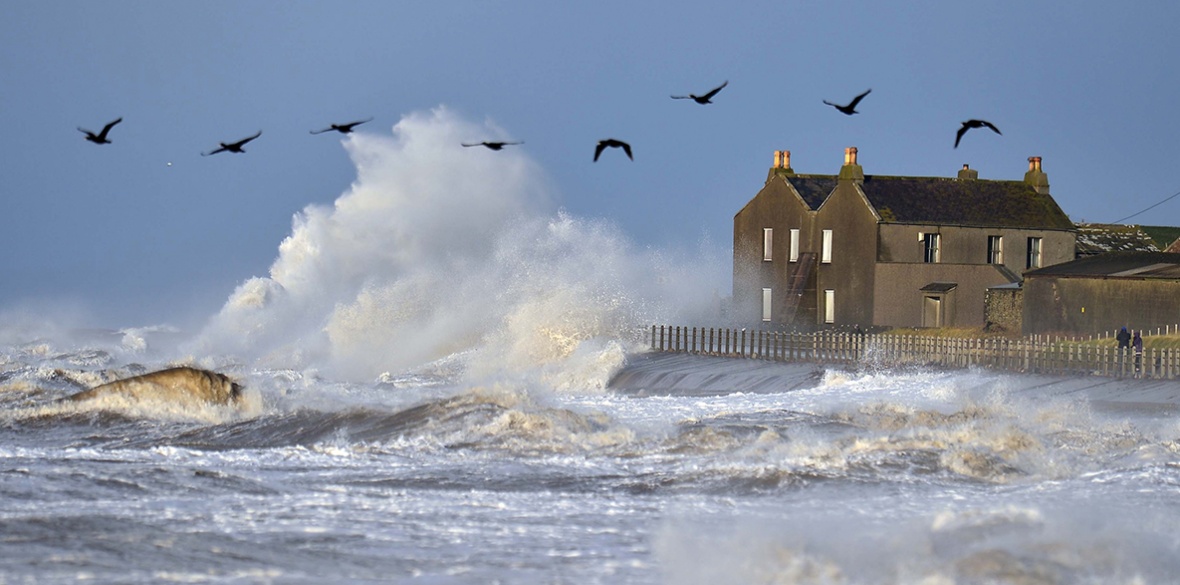This is the last article you can read this month
You can read more article this month
You can read more articles this month
Sorry your limit is up for this month
Reset on:
Please help support the Morning Star by subscribing here
IMAGINE being subjected to ear-shattering blasts every 10 seconds, 24 hours a day for four straight weeks? By any metric, that would qualify as the most appalling form of torture.
But that is exactly what is about to be inflicted on whales, dolphins, seals and other marine creatures in the Irish Sea if a new wave of opposition cannot stop it.
The Irish Sea is already the most radioactive sea in the world, in large part a result of decades of radioactive discharges from the Sellafield reprocessing facility on the Cumbrian shoreline.
Now, Nuclear Waste Services (NWS) has contracted a company called Shearwater Geosciences to blast its undersea seismic airguns off the Cumbria coast this summer, calling it “scientific research.”
NWS, a division of the Nuclear Decommissioning Authority, is tasked with finding a Geological Disposal Facility (GDF) to accommodate the millions of tons of radioactive waste left over from Britain’s commercial nuclear power programme.
Estimates put the cost of the project — paid by taxpayers of course — at between £20 billion to £53bn.
NWS has been exploring sites exclusively in Cumbria, either close to the coast or extending up to the 22km outer limit of UK territorial waters.
The seismic blasting is designed to test the geology beneath the seabed for suitability for an undersea nuclear waste dump.
Terming the project “scientific research” allowed NWS to be granted an exemption for the project, meaning it was not first required to secure a Marine Licence.
The exemption also allowed the project to avoid public scrutiny and meaningful stakeholder engagement.
NWS got the exemption and green light from the government’s Marine Management Organisation, whose chief executive, Tom McCormack, has now been sent a letter signed by prominent environmental groups and individuals, calling for the exemption to be rescinded.
Far from “scientific research,” blasting the sea bed with high-decibel airguns is a desperate effort to find a suitable GDF somewhere, and fast.
The unsolved radioactive waste disposal problem remains the Achilles’ heel of the nuclear power industry, which is looking to expand under the latest reckless Tory government energy plan.
The groups signing the letter argue that the project has nothing to do with pure scientific research and is instead a massive commercial engineering venture that ignores the known science about the very real harm these activities can inflict on marine life. As such, it should not qualify for an exemption.
“The level of noise created by each airgun blast is up to 259 decibels — strong enough to kill a human,” the letter read. “They are roughly 100,000 times more intense than a jet engine.”
Marine animals can hear low-frequency sounds such as those made by seismic airguns as much as 4,000km away.
The blasting interferes with their ability to navigate, mate, evade predators, find food, and nurture their young. It has been shown to damage their hearing and cause immense stress, leading to disorientation and starvation.
Research has clearly shown that “seismic testing can seriously impair the health of marine life, which in the Irish Sea includes whales, dolphins, porpoises, and seals, but some scientific reports also suggest that even tiny shellfish and plankton can be adversely impacted, hazarding the whole marine ecosystem,” said a press release from the Nuclear Free Local Authorities (NFLA), one of the signatories to the letter.
In addition to the harm to marine animals living in the Irish Sea, which is already a Marine Protected Zone, the signatories object to the radioactive waste dump itself which, they point out, will inevitably leak its toxic inventory into the marine environment.
“It is quite inconceivable that a manmade storage environment, however well engineered, will prevent this inevitability over the course of centuries,” read the letter to McCormack.
The groups want the exemption rescinded, forcing NWS to apply for a proper Marine Licence. This opens the way for a full period of consultation, enabling marine welfare and environmental charities in Britain, Ireland and the Isle of Man, along with other government agencies, to weigh in.
“According to the NWS, finding a site for the nuclear waste dump is meant to be based upon public consent,” said Councillor David Blackburn, chair of the NFLA steering committee.
“But if the public do not know anything about the testing, how can they consent and, more importantly, how can they object?”
Linda Pentz Gunter is a writer living in Takoma Park, Maryland, and the founder of non-profit membership organisation Beyond Nuclear (beyondnuclearinternational.org).











